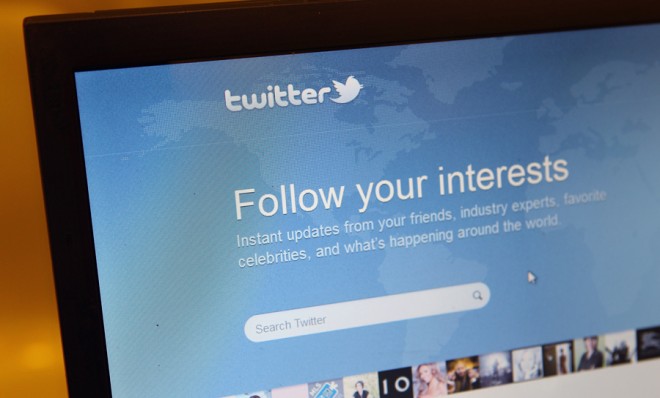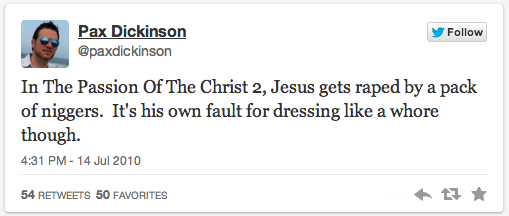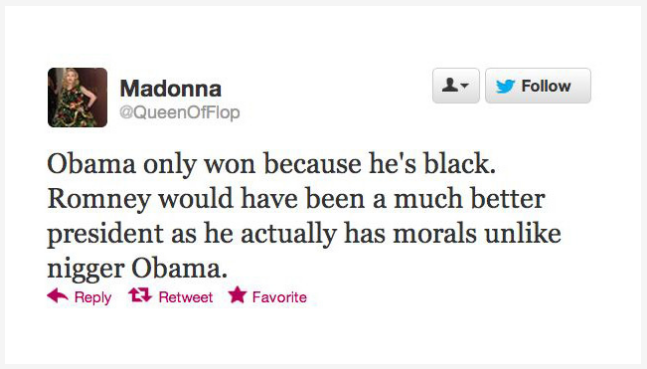Digital etiquette: 5 simple tips for not tweeting like a racist
Does your tweet start with "I'm not racist, but…"? Yeah. Don't tweet that.

A free daily email with the biggest news stories of the day – and the best features from TheWeek.com
You are now subscribed
Your newsletter sign-up was successful
One of the things that makes America an amazing country to live in is its wondrous diversity. The latest case in point: Newly crowned Miss America winner Nina Davuluri, a 24-year-old cognitive science major from New York who also happens to be Indian-American. In fact, she's the first contestant of Indian descent to win the competition. History: Made!
As expected, a few aggrieved naysayers on Twitter were not pleased with the judging table's decision, and had some rather unkind things to say about Ms. Davuluri's bona fides as an American, taking particular note of her brown complexion. Here are a few of them, courtesy of BuzzFeed:

But it's not just random teenagers spouting racially charged nonsense into the Twitter void. Nope! College-educated adults are regularly found guilty of the same egregious offense. Just last week, for example, Business Insider was forced to fire one of its top-level executives, Chief Technology Officer Pax Dickinson, for recently unearthed tweets that said, well, stuff like this:
The Week
Escape your echo chamber. Get the facts behind the news, plus analysis from multiple perspectives.

Sign up for The Week's Free Newsletters
From our morning news briefing to a weekly Good News Newsletter, get the best of The Week delivered directly to your inbox.
From our morning news briefing to a weekly Good News Newsletter, get the best of The Week delivered directly to your inbox.

First things first: Even though their tweets are racist, it doesn't necessarily follow that Pax Dickinson or Miss America's critics hate people because of their skin color. (Dickinson later defended his tweets, saying they were taken "out of context.")
Which is why now is as good an opportunity as any to help folks who aren't persons of color to make an informed tweeting decision, lest they earn a racist-for-life label in the unforgiving Twitter-sphere. Here, a handy guide for those who want to avoid becoming ignorant bigots on the internet:
1. Ask yourself: Am I white?
Find the closest mirror. Or, if a mirror is not easily accessible, snap a selfie. Does the person staring back at you appear to be white? If the answer is yes, congratulations! You've hit the cultural jackpot.
A free daily email with the biggest news stories of the day – and the best features from TheWeek.com
This is a great thing in America, especially since you'll have a much better chance of getting into the college of your choosing, landing a job (even if you're a felon!), and averting the suspicious gaze of law enforcement. But being white does have a drawback. Namely, you run the risk of being labeled a racist should you have the unfortunate habit of uttering dumb marginalizing stuff in a public forum.
Chances are you don't hate people of color. But you could still be guilty of involuntarily adhering to increasingly dated, heteronormative guidelines of what being an "American" really is. This includes, but isn't limited to, erroneously conflating being Indian-American with 9/11. If that sentence is confusing to you, just be sure to pay extra close attention to the next four rules.
2. Make new friends
Before you tweet, ask yourself: Do I have friends of different races? A recent online poll from Reuters/Ipsos found that 40 percent of white Americans and 25 percent of non-whites are surrounded by friends of exclusively their own race. This is not good. It isn't an exact science, but being surrounded solely by people of your own race exponentially increases your future risk of saying racist stuff.
Why is it in your benefit to befriend people of different races in real life? On the internet, people will yell at you and call you mean names should you say something virulently racist, as Pax Dickson learned the hard way. Your real-life friends, on the other hand, have a more complete picture of who you are as a complex, three-dimensional person with a complex, three-dimensional history. If they are good friends, they will kindly inform you not only when what you're saying qualifies as racist, but also why whatever you said is insensitive and hurtful.
Plus, you'll probably get to eat all sorts of great food you had never tried before. (If we ever get to hang out, we can eat chicken adobo. Or leche flan.)
What this isn't, however, is a bargaining chip should you find yourself being labeled a racist. For example: "Well, I have a black friend! So I can say that." Don't ever say that. That's not how this works.
3. Does your tweet start with "I'm not racist, but…"?
If you start a tweet with the above phrase, there is a 200 percent chance that whatever follows it is racist. You also run the risk of being Twitter shamed by accounts like @YesYoureRacist, which is not a good look for you.
4. Does your tweet contain a racial slur?
You shouldn't be flinging racial slurs at people in the first place. On Twitter, doing so is doubly bad, since these are the terms aggressive Twitter shamers can easily find, thanks to the service's ability to parse out keywords.
Keep that in mind should you feel compelled to tweet ugly racist obscenities that reinforce centuries-old bad ideas, especially around controversial news events:

(Note: This isn't actually Madonna.)
5. Being edgy is just kind of sad
Everyone likes being lavished with a little bit of attention once in awhile. That said, filing your racist tweets under the "humor" category, a la Pax Dickinson, isn't clever or funny. It's just unimaginative. And kind of sad, even by high school standards. And it gives your 92 followers a sparkling barometer with which to measure your emotional intelligence. (Which is to say: There isn't much there.)
Using loaded, hurtful words to get a rise out of people? Always a bad idea. Instead, might I suggest trying to understand why those words are loaded and hurtful in the first place? The best part about history is you don't even have to use your imagination.
-
 Why is the Trump administration talking about ‘Western civilization’?
Why is the Trump administration talking about ‘Western civilization’?Talking Points Rubio says Europe, US bonded by religion and ancestry
-
 Quentin Deranque: a student’s death energizes the French far right
Quentin Deranque: a student’s death energizes the French far rightIN THE SPOTLIGHT Reactions to the violent killing of an ultra-conservative activist offer a glimpse at the culture wars roiling France ahead of next year’s elections.
-
 Secured vs. unsecured loans: how do they differ and which is better?
Secured vs. unsecured loans: how do they differ and which is better?the explainer They are distinguished by the level of risk and the inclusion of collateral